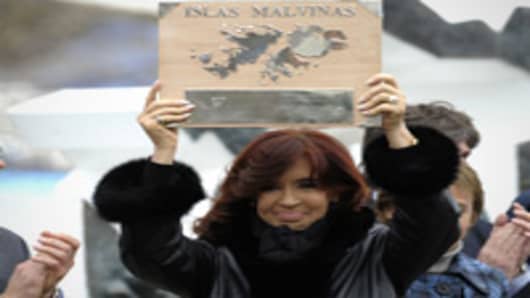As the dust settles on Argentinean President Cristina Fernandez de Kirchner’s announcement that the state would seize control of assets owned by Repsol-backed energy company YPF, many are worried that other companies will shy away from investment in the South American country.
Argentina is famously rich in natural resources, but has been handicapped in the past by political and economic turbulence. Many international investors had their fingers burnt by the 2001 Argentinean default, when the country defaulted on $120 billion of sovereign debt, with a recovery value of just 35 cents in the dollar.
The Argentineans are known for their fierce pride in their country, which is what Kirchner is counting on in order to maintain solid domestic support.
Her actions have been applauded by Hugo Chavez, the left-wing president of Venezuela, which recently nationalized its gold industry and has a longer history of seizing other foreign-owned assets, particularly in the oil industry.
Spanish Prime Minister Mariano Rajoy said it lacked “any justification or economic reason.”
The plans come after Argentina has become increasingly vocal about the retention of British power in the Falklands Islands – known as Las Malvinas in Argentina – and a focal point of nationalistic fervor. Argentina has already made life difficult for oil companies prospecting in the seas around the islands.
Kirchner’s opponents on the right wing of Argentina’s politics are less enamoured of the YPF idea, which will be debated in the Senate next week, but worried about speaking out internationally in case of a voter backlash.
One opposition politician, who did not want to be named, told CNBC.com that the plans were “madness.”
Plenty of the biggest companies in Argentina, including banks and most of its telecommunications infrastructure, are owned by Spanish or Italian parent companies, a legacy of colonialism and the links between Argentina and its former European rulers. Already-troubled Spain has easily the biggest exposure to Argentina.
And most of the major international miners, including Rio Tinto and Xstrata , have operations in the resource-rich country.
Resource nationalism is known to be one of the biggest fears of mining companies miners in general, whether it’s countries that hike taxes, as in the case of Australia, or, in worst-case scenarios, nations that seize back their resources.
Argentina was already taxing oil exports heavily, while subsidising domestic consumption, which had sent the country’s oil balance into deficit in 2011 for the first time in more than two decades.
In that context, it is easier to see why Argentina’s government has been acting so aggressively. Argentina’s government is very limited in how much it can borrow from abroad, after devaluing the peso at the height of its last major economic crisis in 2001.
Foreign investment in the country is falling, while capital is leaving in a steady stream as wealthy Argentineans invest elsewhere.
“The step taken by the authorities in Argentina is a response to specific home-grown challenges brought about by the unraveling of a model that has served the country well since the devaluation of the peso in 2001,” economists at Capital Economics wrote in a research note. “The peso has come under persistent pressure and capital flight is accelerating. Against this backdrop, expropriation of foreign-owned companies has presumably become a useful way to obtain hard currency.”



